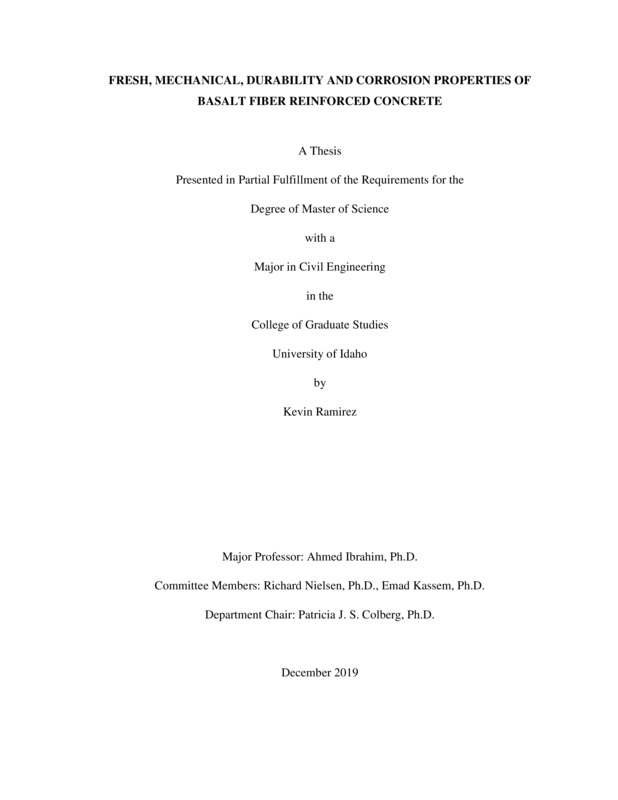FRESH, MECHANICAL, DURABILITY AND CORROSION PROPERTIES OF BASALT FIBER REINFORCED CONCRETE
Ramirez, Kevin. (2019-12). FRESH, MECHANICAL, DURABILITY AND CORROSION PROPERTIES OF BASALT FIBER REINFORCED CONCRETE. Theses and Dissertations Collection, University of Idaho Library Digital Collections. https://www.lib.uidaho.edu/digital/etd/items/ramirez_idaho_0089n_11710.html
- Title:
- FRESH, MECHANICAL, DURABILITY AND CORROSION PROPERTIES OF BASALT FIBER REINFORCED CONCRETE
- Author:
- Ramirez, Kevin
- ORCID:
- 0000-0003-0480-9408
- Date:
- 2019-12
- Embargo Remove Date:
- 2021-06-25
- Keywords:
- Basalt Fiber BFRC Reinforced Concrete
- Program:
- Civil Engineering
- Subject Category:
- Civil engineering
- Abstract:
-
The main goal of this study is to investigate the effects of using basalt fibers on the fresh, mechanical, durability and corrosion properties of basalt fiber reinforced concrete (BFRC). The study is performed with varying basalt fiber volumes of 0%, 0.15%, 0.30%, 0.45% and 0.50% by total concrete volume; utilizing two different water/cement (w/c) ratios of 0.35 and 0.40. The results were compared to conventional concrete as well as steel fiber reinforced concrete (SFRC). The first part of the experimental program, consisted of 14 different concrete mixtures that have been cast using conventional Portland cement with a design compressive strength of 5,075 psi at 28 days (typical strength for slabs and similar applications in which fiber reinforced concrete (FRC) are utilized). The second part of the experimental program investigated the effect of basalt fiber on corrosion rates and corrosion potential for steel reinforcement embedded in mortar mixtures. The first experimental program included fresh, mechanical and durability properties of the developed concrete mixtures. The fresh properties included slump and unit weight; mechanical properties included compressive strength, tensile strength, flexural strength and average residual strength; durability properties included unrestrained drying shrinkage and chloride ion penetrability evaluation. The developed mixtures were prepared and evaluated by the American Society for Testing and Materials (ASTM) standards. The second experimental program investigated the effects of basalt fibers on corrosion properties of steel reinforcement embedded in mortar by performing a rapid macrocell corrosion evaluation test, prepared and evaluated by Federal Highway Association (FHWA) Report FHWA-HRT-07-043.
It is concluded that the use of basalt fibers reduces slump values as fiber volume increases, however with the use of the right amount of HRWA, slump target values can be achieved. Results indicate that the use of basalt fibers improve tensile, flexural, and average residual strength properties as fiber volume increase; up to 28.92%, 45.86% and 71.82%, respectively. Results also suggest that the use of basalt fibers may decrease compressive strength at 28 days. Durability properties are also improved with the addition of basalt fibers as fiber volume increases. It is suggested to use a fiber volume of 30% to optimize overall mechanical and durability properties of the mixtures. On the other hand, results suggest that the use of basalt fibers may increase corrosion rates and accelerate the time of corrosion of steel reinforcement embedded in mortar. Therefore, is not suggested to be used for such applications.
- Description:
- masters, M.S., Civil Engineering -- University of Idaho - College of Graduate Studies, 2019-12
- Major Professor:
- Ibrahim, Ahmed
- Committee:
- Nielsen, Richard ; Kassem, Emad
- Defense Date:
- 2019-12
- Identifier:
- Ramirez_idaho_0089N_11710
- Type:
- Text
- Format Original:
- Format:
- application/pdf
- Rights:
- In Copyright - Educational Use Permitted. For more information, please contact University of Idaho Library Special Collections and Archives Department at libspec@uidaho.edu.
- Standardized Rights:
- http://rightsstatements.org/vocab/InC-EDU/1.0/

